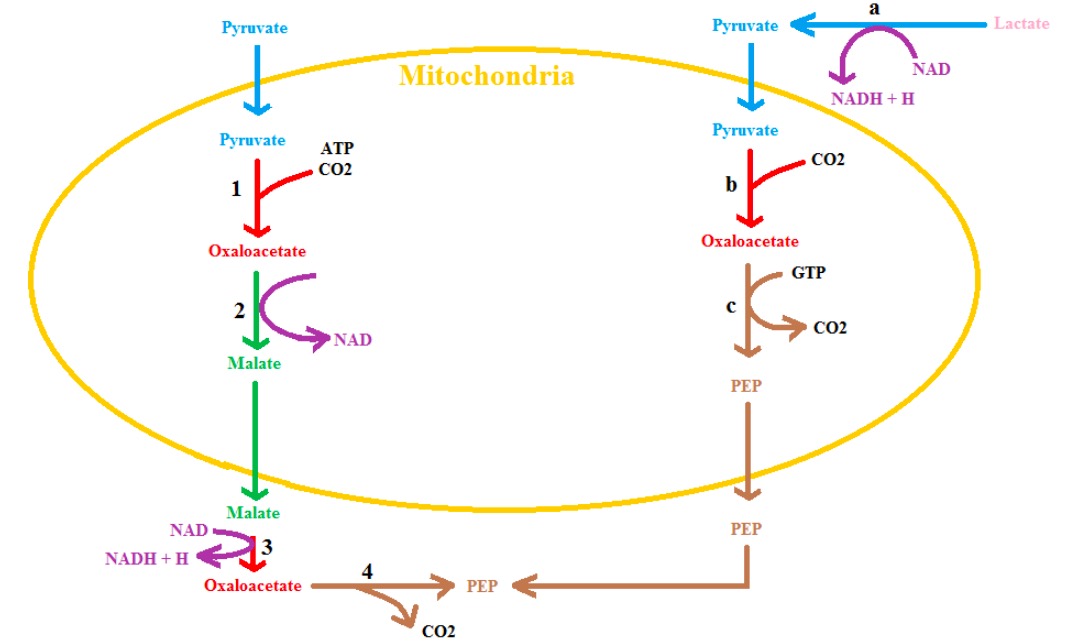Playlist
Show Playlist
Hide Playlist
Gluconeogenesis: Synthesis of Glucose
-
05 Advanced CarbohydrateMetabolism2.pdf
-
Reference List Biochemistry.pdf
-
Download Lecture Overview
00:01 I wanna spend some time now talking about the pathway of gluconeogenesis. This is the way that cells makes glucose and this pathway is very very important, especially for a multicellular organism. 00:14 Multicellular organisms have a fairly constant need for glucose. 00:17 Our eyes need it pretty badly. Our brains needs it and they don't have ways of producing it. So maintaining glucose concentration is important. 00:26 There is two ways that we can get glucose. We can get it from our diet and we are not constantly eating even though sometimes it might feel like that and we can also get it from synthesizing intake and that's where gluconeogenesis comes in. 00:37 So gluconeogenesis kind of fills in the gaps when we are not filling them in by filling our stomachs. 00:44 It's important for cells to be able to control gluconeogenesis; because, it's the opposite of glycolysis. 00:49 And we don't want to have a breakdown pathway going on at the same time as a synthesis pathway. So one of the ways in which this pathway is regulated is through localization. 01:00 It turns out that in our body, gluconeogenesis doesn't even occur in every cell. It occurs primarily in our liver and our kidneys. 01:07 And even within those cells there is some localization of the enzymes, as we shall see. 01:12 Now the reactions of gluconeogenesis, there actually are 11 reactions of gluconeogenesis, and I will talk about those specifically the different ones in this discussion. 01:23 Last I will talk about regulation. So let's get into it. 01:29 The synthesis of glucose, as I said, was important for regulating blood glucose. 01:34 And so we have reactions in gluconeogenesis that occur within a cell that actually does gluconeogenesis in the cytoplasm, in the mitochondrion, and the endoplasmic reticulum. 01:44 You recall that all the reactions of glycolysis occurring in the cytoplasm. 01:49 In the body, as I said, we make glucose in two primary organs, the liver and the kidney. 01:54 And the liver of the two is pretty much the most important because it helps modulate all kinds of nutritional needs in our body. 02:03 Now in gluconeogenesis there are 4 reactions that replace 3 reactions in glycolysis and they are the ones we will focus on for this talk. 02:13 All the other reactions are simply the reverse of glycolysis reactions. They are 7 of them. 02:19 In glycolysis we had 10 reactions and gluconeogenesis we'll have 11. 02:24 So to make a glucose, glucose has 6 carbons, we need two molecules of pyruvate because there is 3 carbons in each pyruvate.
About the Lecture
The lecture Gluconeogenesis: Synthesis of Glucose by Kevin Ahern, PhD is from the course Carbohydrate Metabolism.
Included Quiz Questions
Which of the following is true of gluconeogenesis?
- It bypasses three enzyme reactions of glycolysis.
- It starts with acetyl-CoA.
- It occurs in very few cells of the body.
- It occurs solely in the mitochondrion.
- It needs one pyruvate molecule to make one glucose molecule.
Customer reviews
5,0 of 5 stars
| 5 Stars |
|
5 |
| 4 Stars |
|
0 |
| 3 Stars |
|
0 |
| 2 Stars |
|
0 |
| 1 Star |
|
0 |




